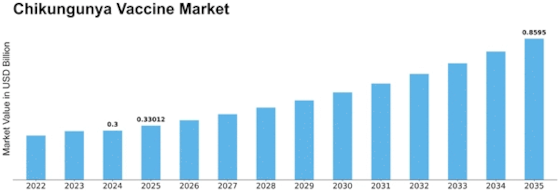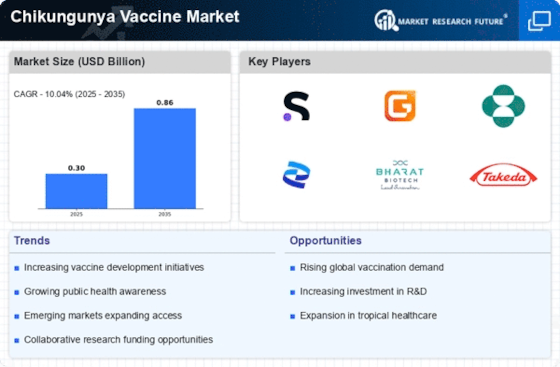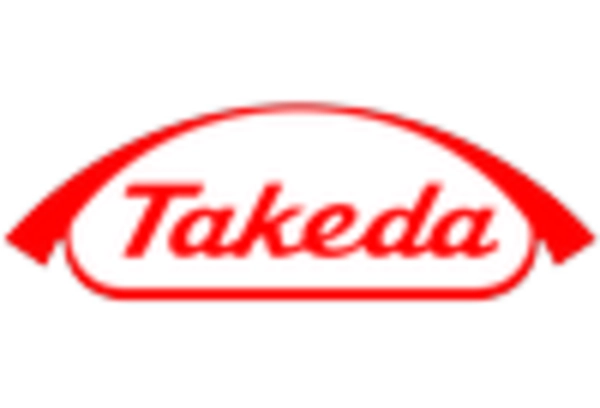Chikungunya Vaccine Size
Chikungunya Vaccine Market Growth Projections and Opportunities
Chikungunya vaccines come in various forms, including live-attenuated virus vaccines, inactivated viral vaccines, recombinant viral vaccines, chimeric-alphavirus candidates, and others. The prevalence of chikungunya fever is on the rise, and there is a growing awareness about infections transmitted by mosquitoes. Governments around the world are taking initiatives to prevent and control chikungunya. However, the growth of the chikungunya vaccines market faces challenges due to stringent regulatory requirements. On the flip side, there are increasing unmet needs for chikungunya treatment in developing and underdeveloped countries, which present significant growth opportunities for companies involved in the chikungunya vaccines market.
Chikungunya is a viral infection transmitted to humans through mosquito bites, primarily by Aedes mosquitoes. The disease is characterized by symptoms such as fever, joint pain, headache, and muscle pain. In some cases, it can lead to chronic joint pain that persists for months or even years. Given the impact of chikungunya on individuals and communities, there is a growing focus on developing effective vaccines to prevent the spread of the virus.
The various types of chikungunya vaccines cater to different needs and preferences in the medical community. Live-attenuated virus vaccines use weakened forms of the virus to stimulate an immune response without causing the disease. Inactivated viral vaccines use killed virus particles to achieve a similar effect. Recombinant viral vaccines are created by genetic engineering, and chimeric-alphavirus candidates involve combining genetic material from different sources. These diverse approaches reflect the ongoing efforts to find the most effective and safe way to immunize individuals against chikungunya.
The global rise in chikungunya cases has prompted increased awareness about the role of mosquitoes in spreading infections. Governments and health organizations are implementing initiatives to control mosquito populations and prevent the transmission of diseases like chikungunya. These efforts involve public awareness campaigns, mosquito control programs, and community engagement to reduce the breeding grounds for mosquitoes.
Despite the promising prospects, the chikungunya vaccines market faces challenges due to strict regulatory requirements. Developing and gaining approval for vaccines involves rigorous testing and compliance with regulatory standards to ensure safety and efficacy. These requirements can pose obstacles for companies looking to bring new vaccines to market. Overcoming these regulatory hurdles requires substantial investments in research, development, and clinical trials.
On a positive note, there is a significant opportunity for growth in the chikungunya vaccines market, especially in developing and underdeveloped countries. These regions often bear a disproportionate burden of mosquito-borne diseases, including chikungunya. The rising unmet needs for effective treatments and preventive measures in these areas present a compelling market opportunity. Companies that can navigate the regulatory landscape and provide affordable and accessible vaccines stand to make a substantial impact on public health in these regions.
The chikungunya vaccines market is driven by the increasing prevalence of chikungunya fever and growing awareness about mosquito-transmitted infections. Government initiatives play a crucial role in preventing and controlling the spread of the virus. However, stringent regulatory requirements pose challenges for market growth. Despite these challenges, there are significant opportunities in developing and underdeveloped countries where the unmet needs for chikungunya treatment create a fertile ground for market expansion. As research and development efforts continue, the chikungunya vaccines market holds promise for addressing a pressing global health concern.




















Leave a Comment